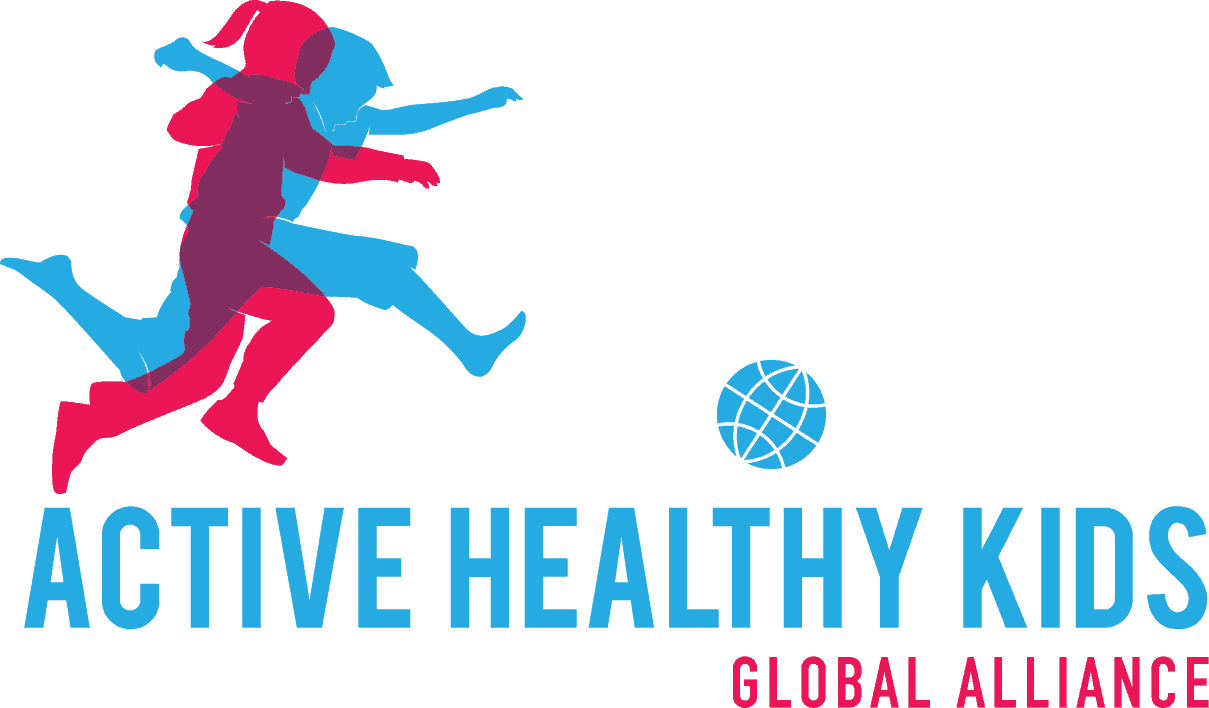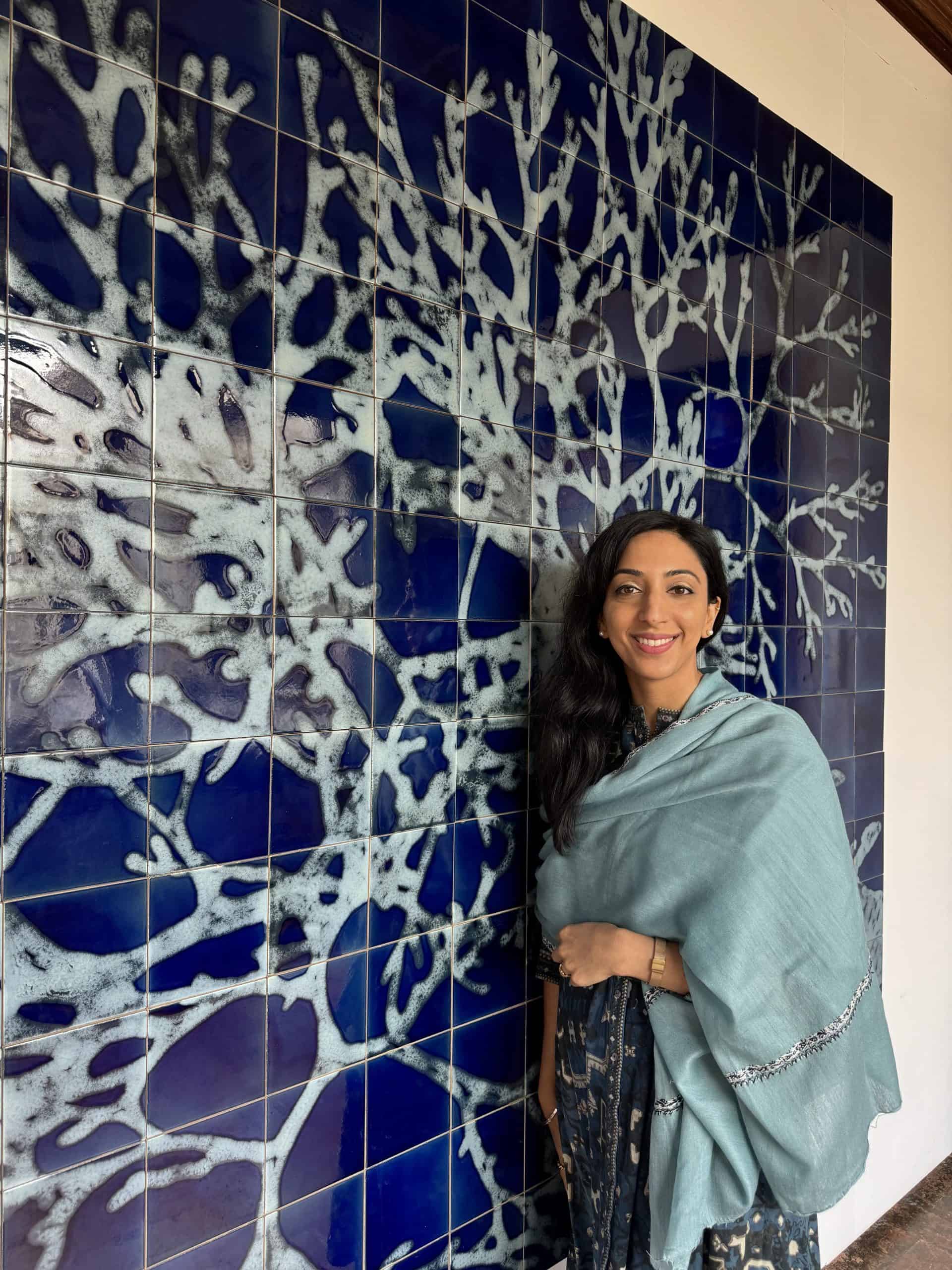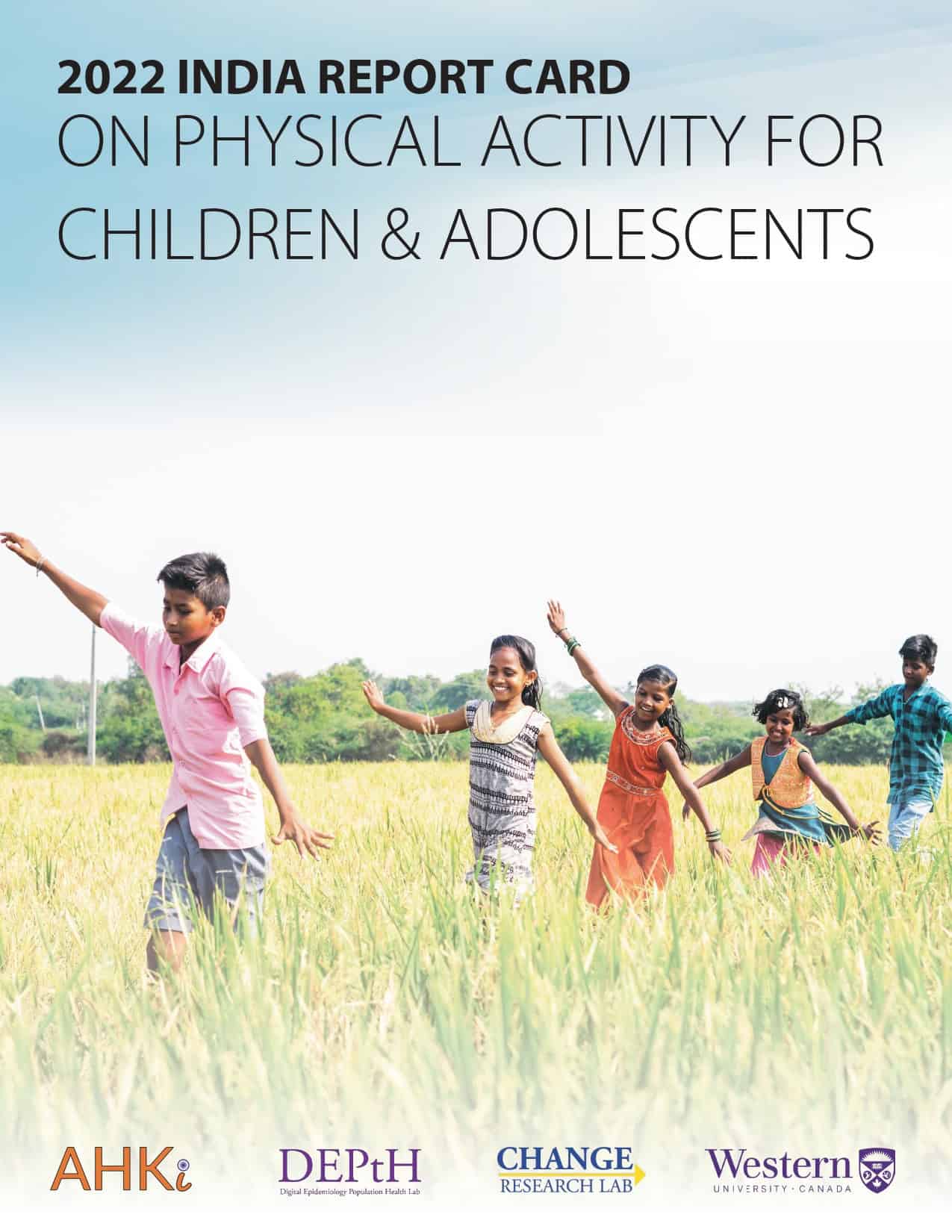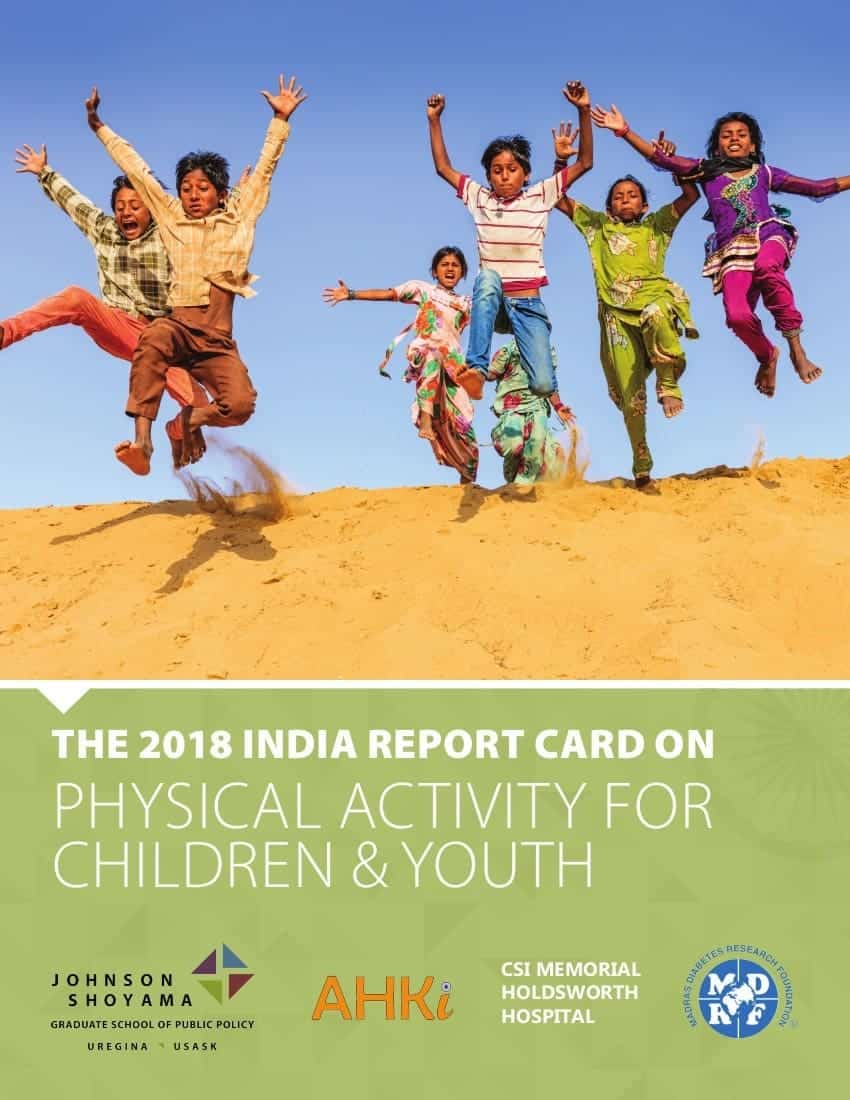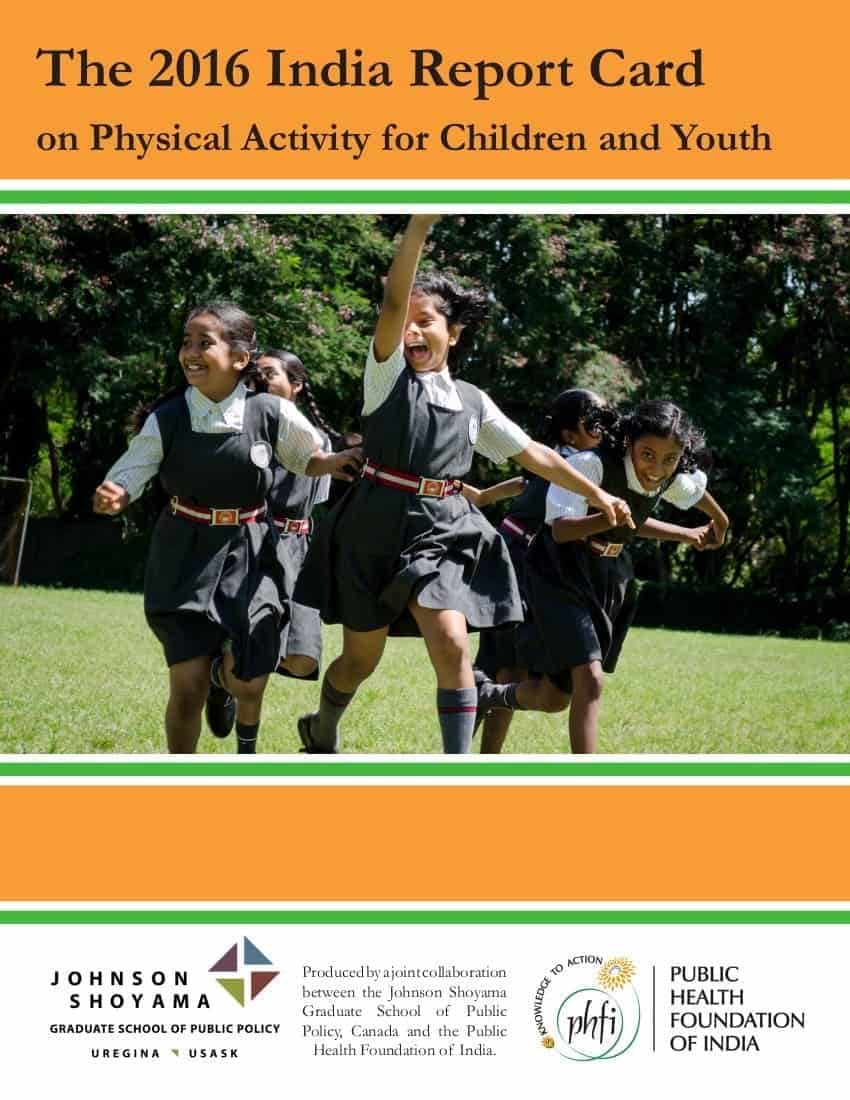
Report Card Leaders
Tarun Katapally, M.S., Ph.D.
Professor Katapally is a physician and patient-oriented research leader who established the Digital Epidemiology and Population Health Laboratory (DEPtH Lab) in 2017 to develop a sustainable program of digital health research by scaling up the Smart Platform. Smart is a citizen science and digital epidemiological platform, which uses big data for one integrated outcome: health equity by addressing existing and emerging population health crises. In essence, Smart Platform enables the engineering of digital health solutions by harnessing the power of big data, with an emphasis on ethical citizen engagement, data sovereignty, and Internet equity. Dr. Katapally’s team conceptualizes, develops, and implements digital health platforms by intersecting citizen science and social innovation.
One of the key objectives of DEPtH Lab is to build capacity of high-quality training personnel to develop societal solutions in these areas: Active living; Child and youth health; Climate change; Food security and sovereignty; Global health; Indigenous health; Infectious diseases; Mental health; Substance misuse.
Jasmin Bhawra, PH.D.
Dr. Jasmin Bhawra is an Assistant Professor in the School of Occupational and Public Health at Toronto Metropolitan University, and Director of the CHANGE Research Lab. As a population health researcher and program and policy evaluator, Dr. Bhawra works with interdisciplinary research teams, global communities, and health system partners on a range of initiatives focused on climate change impacts on health, equitable active living, the youth mental health crisis, community food security, and non-communicable disease prevention.
Using mixed methods and digital health innovations, the CHANGE Research Lab aims to address health inequities experienced by historically disenfranchised and underserved populations, including racialized and immigrant communities, children, and youth. Dr. Bhawra brings her evaluation and knowledge mobilization expertise to inform the development and implementation of culturally-appropriate interventions across low-, middle- and high-income countries via the Global Report Cards on Physical Activity for Children and Youth. She is currently Co-Leader of the India Report Card and Co-founder of Active Healthy Kids India — a non-profit organization that advocates for active living research and practice among Indian children and youth.
X: @DrJasminBhawra @ChangeResLab @ActiveKidsIndia
Instagram: @climatecareto
LinkedIn: www.linkedin.com/company/change-research-lab/
Website: www.jasminbhawra.com
Report Card Grades
- Overall Physical Activity: C*
- Organized Sport and Physical Activity: INC
- Active Play: INC
- Active Transportation: B-
- Sedentary Behavior: D-
- Physical Fitness: INC
- Family and Peers: INC
- School: C
- Community and Environment: D
- Government: C+
Related Links
Report Card Leaders
Jasmin Bhawra, Ph.D.
Dr. Jasmin Bhawra is an Assistant Professor in the School of Occupational and Public Health at Toronto Metropolitan University, and Director of the CHANGE Research Lab. As a population health researcher and program evaluator, she leads health initiatives focused on mental health, physical activity, food sovereignty, and climate change.
Using mixed methods digital health innovations, her research prioritizes historically disenfranchised or disadvantaged populations, including BIPOC communities, children and youth. She uses her evaluation and knowledge mobilization expertise to inform health policy across low-, middle- and high-income countries via the Global Report Cards on Physical Activity for Children and Youth. She has worked with public health units, non-profit organizations, and the Hospital for Sick Children coordinating research, and leading health program evaluations. Dr. Bhawra is co-founder of Active Healthy Kids India, a non-profit organization that influences, and advocates for active living research and practice.
Twitter: @DrJasminBhawra @ChangeResLab @ActiveKidsIndia
Website: www.jasminbhawra.com
Tarun Katapally, M.S., Ph.D.
Professor Katapally is a physician and patient-oriented research leader who established the Digital Epidemiology and Population Health Laboratory (DEPtH Lab) in 2017 to develop a sustainable program of digital health research by scaling up the Smart Platform. Smart is a citizen science and digital epidemiological platform, which uses big data for one integrated outcome: health equity by addressing existing and emerging population health crises. In essence, Smart Platform enables the engineering of digital health solutions by harnessing the power of big data, with an emphasis on ethical citizen engagement, data sovereignty, and Internet equity. Dr. Katapally’s team conceptualizes, develops, and implements digital health platforms by intersecting citizen science and social innovation.
One of the key objectives of DEPtH Lab is to build capacity of high-quality training personnel to develop societal solutions in these areas: Active living; Child and youth health; Climate change; Food security and sovereignty; Global health; Indigenous health; Infectious diseases; Mental health; Substance misuse.
Report Card Grades
- Overall Physical Activity: D
- Organized Sport and Physical Activity: INC
- Active Play: C-
- Active Transportation: B-
- Sedentary Behavior: C-
- Physical Fitness: F
- Family and Peers: D
- School: INC
- Community and Environment: D
- Government: D
Related Links
Top Three Priorities
- Investments in active living research and policy
- A national strategy for physical activity for children and youth
- Minimizing gender-based inequities
Report Card Leaders
Tarun Katapally, M.S., Ph.D.
Dr. Tarun Katapally is a population health policy researcher with a specific interest in active living policy. Currently, he is an Associate Professor at the Johnson Shoyama Graduate School of Public Policy, University of Regina, Canada, and an Adjunct Professor in the College of Medicine at the University of Saskatchewan, Canada. He is the leader of the India Report Cards on the Physical Activity of Children and Youth. He co-founded Active Healthy Kids India for catalyzing active living research in India to address existing evidence gaps in the second-most populous country in the world.
Dr. Katapally brings a global perspective to active living research by combining his clinical experience with interdisciplinary epidemiological methods. Dr. Katapally’s expertise is in linking advanced mixed-methods and complex analytical techniques with community-based participatory research. His work aims to understand the impact of policy and policy-driven contexts and systems on health and wellbeing of populations, with specific emphasis on active living among children and youth. Increasingly, his focus is on combining citizen science with digital epidemiological tools in informing active living policies through integrated knowledge translation.
Jasmin Bhawra, Ph.D. Candidate
Jasmin is a population health researcher and program evaluator whose research interests include nutrition, physical activity, chronic disease prevention, and health policy with a specific focus on vulnerable populations. She has worked with public health units, non-profit organizations, and the Hospital for Sick Children coordinating research and leading health program evaluations. Jasmin is co-founder of Active Healthy Kids India, a non-profit organization dedicated to active living and health research and advocacy for Indian children and youth.
Testimonial
"Being part of the Global Matrix since 2016, we have been extremely fortunate to witness the growth of this international alliance. We experienced not only the cross-country exchange of knowledge first-hand, but also were able to establish a Canadian-Indian research collaboration to address gaps in evidence using innovative methods." - Tarun Katapally, M.S., Ph.D. and Jasmin Bhawra, Ph.D. Candidate
Conference Abstract: Movement to Move
Title: Results from India’s 2018 Report Card on Physical Activity for Children and Youth
List of Authors:
Jasmin Bhawra, Priyanka Chopra, Ranjani Harish, Anjana Mohan, Krishnaveni V Ghattu, Kumaran Kalyanaraman, and Tarun R Katapally
Introduction
With India’s youth projected to be a major proportion of the world’s workforce, evaluating active living in India has implications for the world economy. The 2018 India Report Card (IRC) addresses evidence gaps identified in the 2016 IRC using peer-reviewed and grey literature, as well as primary data obtained through key partners.
Methods
A systematic search of peer-reviewed and grey literature was conducted for all 10 indicators identified by Active Healthy Kids Global Alliance (AHKGA). Peer-reviewed data were appraised based on representativeness, sample size, data quality, and timeliness (i.e., recentness of data). Grey literature was appraised based on comprehensiveness, validity of the sources cited, and representativeness. Nationally representative data were given a higher weightage, followed by published data, unpublished raw data, and grey literature. Each indicator was assessed against parameters provided by AHKGA, and grades were assigned based on team consensus using the standardized rubric.
Results
A major proportion of the children and youth in India are not meeting recommended physical activity and sedentary behaviour guidelines (see Table 1). Physical activity type and levels varied significantly across the intersection of gender and socioeconomic status, with girls belonging to lower socioeconomic status having the greatest disadvantage due to cultural and safety perceptions. Based on the grades assigned to “Family and Peers” (D), “Community and Built Environment”(D), and “Government”(D), the active living challenges faced by children and youth in India could be attributed to lack of adequate political, social, and physical environmental support.
Conclusions/Recommendations
The 2018 IRC shows that although the vast majority of children and youth in India are not accumulating recommended levels of physical activity, there are encouraging signs of their participation in active transportation and active play. Active Healthy Kids India has been established to develop a nationally representative survey, and advocate for investments and policies to improve active living among children and youth in India.
Table 1: Grades and Rationale for India’s 2018 Report Card
| Indicators | Grades | Rationale |
| Overall Physical Activity | D | Approximately 25% of children and youth accumulate ? 60 minutes of MVPA daily. It is expected that children and youth from rural areas accumulate greater MVPA, however data from these populations is sparse and difficult to align with MVPA guidelines. |
| Organized Sport Participation | INC | Insufficient data to grade this indicator. |
| Active Play | C- | An average of 49% of children and youth spend at least 1 hour playing outdoors, and 37% spend at least 1 hour in active play. |
| Active Transportation | B- | A weighted average of approximately 65% of children and youth reported walking or cycling to school on a regular basis. |
| Sedentary Behaviours | C- | Less than half of Indian children and youth are meeting screen time-based sedentary behaviour guidelines. |
| Physical Fitness | F | Approximately 15% of children and youth meet recommended standards for minimum fitness. |
| Family and Peers | D | Approximately 30% of family/peers participate in physical activity with children and provide support/transport/access to physical activities. |
| Schools | INC | Insufficient data to grade this indicator. |
| Community and Built Environment | D | Six major Indian cities received low walkability ratings due to poor and unsafe infrastructure, and lack of sidewalks. Moreover, built environment was rated poorly for lack of urban infrastructure for walking and biking, access to physical activity spaces, safety from crime and traffic, and high pollution. |
| Government | D | The majority of government strategies in India are focused on competitive sport. There is no readily available evidence of strategies and investments directed towards all children and youth, with a purpose to increase active living among the entire population. |
Report Card Grades
- Overall Physical Activity: C-
- Organized Sport Participation: INC
- Active Play: INC
- Active Transportation: C
- Sedentary Behaviors: C
- Family and Peers: INC
- School: INC
- Community and Built Environment: INC
- Government Strategies and Investments: D
Related Links
Recommendations
- Addressing the dearth of active living evidence by resource allocation towards active living research.
- Development of a national strategy for physical activity of children and youth;
- Investments at national, state, local jurisdictional, and school and community levels;
- Culturally and geographically appropriate policy interventions (e.g. urban vs. rural);
- Facilitating active living through urban planning policy;
- Physical activity education and promotion directed towards families and educators.
Report Card Leader
Tarun Katapally, M.S., Ph.D.
Dr. Katapally is a medical doctor trained in India and a population health policy researcher. He is currently a faculty member at the Johnson-Shoyama Graduate School of Public Policy that is based at the Universities of Regina and Saskatchewan. He is also an adjunct faculty member in the Department of Community Health and Epidemiology at the University of Saskatchewan. Dr. Katapally’s expertise is in the employment of advanced mixed-methods and complex analytical techniques to understand the influence of policy and policy-driven social and physical contexts on the influence of children’s physical activity and sedentary behaviour.
Increasingly, his focus is on active living policy and integrated knowledge translation, and in this pursuit, he focuses on child cohorts at different stages in the life course including preschoolers, preadolescents and adolescents. He also works extensively with Indigenous children and youth and brings to this team a community-based participatory research approach. Apart from several population health projects, Dr. Katapally is currently a co-lead in the Canadian Institutes of Health Research funded study, Seasonality and Active Saskatoon Kids. This study utilizes complex methodological tools such as global positioning system equipped accelerometer to examine the influence of multiple contexts, including weather variation on physical activity and sedentary behaviour in children. Working at the School of Public Policy, Dr. Katapally’s international network extends beyond academia and community to include policymakers and public health administrators. Dr. Katapally has established a collaboration with Dr. Shifalika Goenka of the Public Health Foundation of India to work towards the development of the India Report Card.
Testimonial
"It has been an incredible experience to be a part of a complex collaborative effort between active living researchers around the world. I am confident that this knowledge exchange endeavour across countries can initiate changes in how governments and stakeholders look at the value of promoting physical activity among children." - Tarun Katapally, M.S., Ph.D.
Conference Abstract: 6th International Congress on Physical Activity and Public Health
Results from the India 2016 Report Card on Physical Activity for Children and Youth
Katapally TR, Goenka S, Bhawra J, Mani S, Krishnaveni GV, Kehoe SH, Lamkang AS, Raj M, McNutt K
Background: Physical inactivity in children and youth in India is a major public health problem. The India 2016 Report Card on Physical Activity for Children and Youth has been conceptualized to highlight this epidemic by appraising behaviours, contexts, strategies and investments related to physical activity of Indian children and youth. Methods: A Canadian-Indian research collaboration resulted in the formation of a Research Working Group (RWG). RWG determined key indicators; identified, synthesized and analyzed existing evidence; developed criteria for assigning grades; and assigned grades to indicators based on consensus. Results: Overall Physical Activity Levels were assigned a grade of C-. Active Transportation and Sedentary Behaviours were both assigned a grade of C. Government Strategies and Investments was assigned a grade of D. Six other indicators, including the country-specific indicator, “Physical Fitness”, were graded as incomplete due to the lack of nationally representative evidence. Conclusions: Based on existing evidence, it appears that most Indian children do not achieve recommended levels of physical activity and spend most of their day in sedentary pursuits. The Report Card identifies gaps in both investments and research that need to be addressed before understanding the complete picture of active living in children and youth in India.
